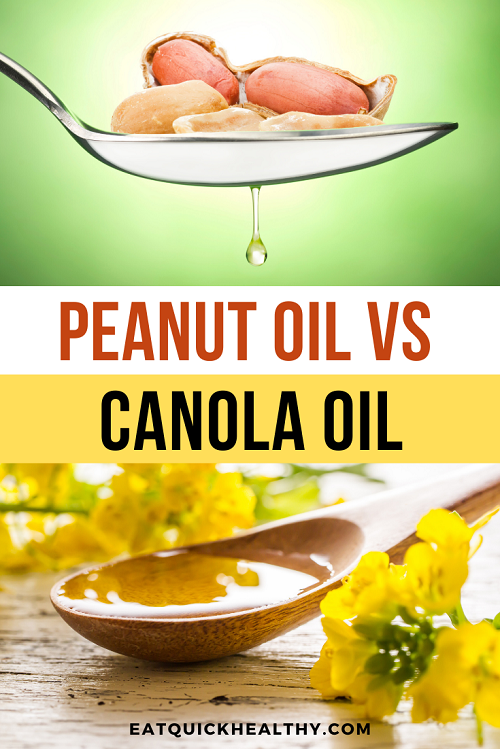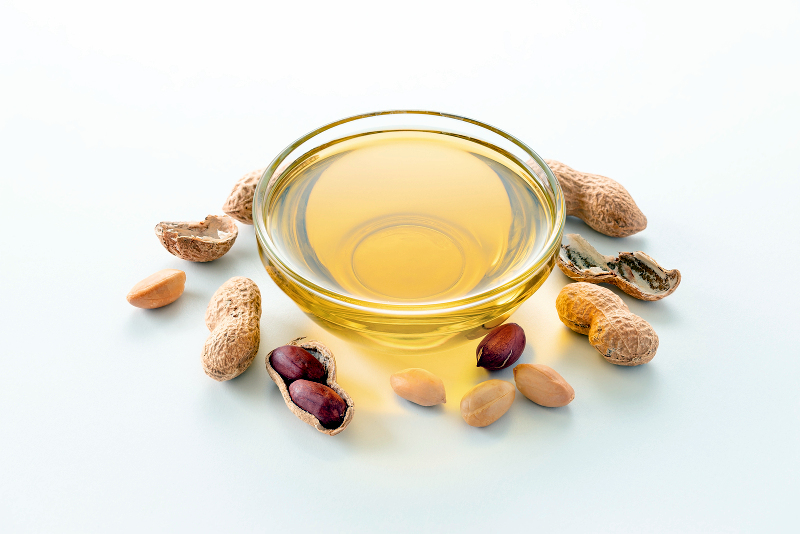Are you confused about the difference between peanut oil and canola oil? If you are, then you’re in luck as we have a comprehensive guide comparing the two different cooking oils.
From smoke point to deep frying, and from uses to health benefits, we’ve got you covered. And by the end of this blog, you’ll know the difference between peanut oil and canola oil and which is the right oil for what you need.

What Is Peanut Oil?
If you’re looking for cooking oil, peanut oil can do the trick. It’s great for frying foods, but it also has numerous uses besides that. The edible seeds from a peanut plant are taken and used to create this vegetable-based oil. And if you see arachis oil or groundnut oil on the shelf in a supermarket, it’s the same thing as peanut oil.
There is a selection of different types of oil, including cold-press peanut oil, refined peanut oil, peanut oil blends and gourmet peanut oil. Also, the taste of peanut oil can vary depending on the way it’s processed.
Peanut oil is also something that has a history of being used as a sort of medicine, anecdotally helping with things like heart disease, dry skin, constipation and joint pain.

Is Peanut Oil Healthy?
There are pros and cons to consuming peanut oil. It’s high in vitamin E, which is an important thing for your body to have to help combat heart issues and to be protected from free radical damage. Peanut oil is also considered to be something that aids in lowering the blood sugar levels of those with diabetes.
However, one issue with using peanut oil is that it’s high in omega-6, which is a fatty acid that’s linked to inflammation and other health problems. The oil also has the potential for oxidation, which can also yield unsafe consequences.
What Is Canola Oil?
Like peanut oil, canola oil is a vegetable-derived oil. This cooking oil is created by crushing and utilizing canola seeds. It’s a popular cooking ingredient to use because of its high smoke point, light flavor and texture. It’s also versatile, as it can also be used as a salad dressing and to grease pans to ensure baking doesn’t stick.
There are three main kinds of canola oil, refined, unrefined and expeller press.
Is Canola Oil Healthy?
Canola Oil is known to be lower in saturated fat relative to other cooking oils on the market, making it a popular choice for those who want to lower their cholesterol levels. Besides flaxseed oil, canola oil has the highest amount of omega-3 in it, which is an important thing to consume. This will help people with managing inflammation, blood pressure and, potentially, heart disease.
However, just like most cooking ingredients, there can be a negative side. Depending on which canola oil you purchase, there may be low levels of trans fat, which is an unhealthy thing to consume. Also, it can be highly refined, meaning the process of making canola oil may decrease the amount of nutrients it has.
Buying unrefined canola oil (and peanut oil) is the healthier choice.

Peanut Oil Vs Canola Oil
Is peanut oil better than canola oil, that’s the question you want to know the answer to. Below we’ll break down essential parts of each oil, including discussing their smoke points, composition and uses. After that, it’ll be up to you to determine which oil best serves your needs.
Peanut Vs Canola Oil Smoke Point
A difference between peanut oil and canola oil is their smoke points. Peanut oil’s smoke point usually goes up to 450 degrees Fahrenheit, or 232 degrees Celsius, hence why it’s a go-to for frying foods. Whereas refined canola oil’s burning point clocks in at 400 degrees Fahrenheit/204 degrees Celsius.
If you choose to use expeller press canola oil, you can get some that are rated up to 450 degrees Fahrenheit.
So, if you’re looking to have a high temperature without burning the oil, peanut oil is the more popular choice.
Oil Composition
There are a handful of main fatty acids that make up peanut oil. Specifically, around 50% of it is oleic acid and 27-32% is palmitic acid. Arachidic acid, behenic acid and lignoceric acid are a part of peanut oil as well, but at a much lower percent.
On the other end, canola oil is made up of three main fatty acids, 64% monounsaturated fat, 28% polyunsaturated fat and 7% saturated fat. And as mentioned earlier, it can also include sub-5% levels of trans fat.
Peanut Oil Vs Canola Oil For Deep Frying
It’s important to have an oil with a high smoke point for deep frying as the cooking method requires an extreme temperature. As mentioned earlier, peanut oil on average has a higher burn point than canola oil, making it the ideal choice for deep frying from this aspect.
However, canola oil is still a very popular choice for deep frying as it still has a relatively high smoke point. And if you plan on using a lot of oil to deep fry, canola oil is typically cheaper than peanut oil, so that’s something to consider.
Lastly, canola oil has less of a taste than peanut oil.
Peanut Oil Vs Canola Oil For Deep Frying Turkey?
If you’re taking a turkey out of the freezer and planning on deep frying the bird, and you have to choose between peanut oil and canola oil, then peanut oil is a great option.
Typically, you need to have a cooking oil that has a smoke point above 425 degrees Fahrenheit, and refined canola oil only goes up to 400 degrees Fahrenheit. Expeller press canola oil does have a burning point of up to 450 degrees Fahrenheit though.
With peanut oil, it’s rated to handle temperatures of up to 450 degrees, which is great for deep frying a turkey, among other things.
Peanut Oil Versus Canola Oil Uses
Peanut oil and canola oil have several uses, and not just for cooking. Starting with peanut oil, it’s a very popular choice for frying food, considering its high burning point. Many restaurants purchase refined peanut oil to solve their deep frying needs, especially because they can cook several different foods in it without the oil absorbing the flavors of the food.
Interestingly, peanut oil has also been used for medicine as well. It’s important to note that there is insufficient evidence to proclaim that this oil actually helps with some ailments, however it’s been linked to aiding constipation, joint pain and heart disease. It’s also known to combat dry skin.
Canola oil has a multitude of different uses in the kitchen. It’s commonly used as a cooking oil for stir-frying and grilling different kinds of food. It’s also great to use in baking, as well as being a pan greaser.
Instead of using butter or margarine, canola oil is a prime alternative. And you can sprinkle it on salads, and use it for marinades and different kinds of sauces.
Can You Mix Peanut And Canola Oil?
If you’re asking yourself whether can you mix peanut oil and canola oil, then we’ve got an answer for you.
Canola and peanut oil can be mixed, and this will typically be done if someone runs out of a certain oil. But there are things to know if you do decide to mix them together. First, they have relatively the same smoke point, especially if you own expeller press canola oil.
But if you plan on using a lot of oil, it’s always a best practice to stick with one oil instead of adding them together as they could have different cooking properties that can alter your dish.
For example, peanut oil has a bit of a peanut taste to it, and if you don’t want that, then stick with canola oil. Also, peanut allergies are common, so that’s something else to consider if you’re cooking for a large group of people, especially if you don’t know everybody.
Other Things To Consider
Another big thing to consider is the price of canola oil versus the price of peanut oil. On average, peanut oil is more expensive than canola oil on a per 100-millilitre basis. So if you’re buying it in bulk, or you’re cooking something that can utilize either oil, then canola oil may be the best option for you.
Conclusion
We’ve given you a thorough comparison of peanut oil vs canola oil. But when choosing between peanut oil or canola oil, it’s mostly up to you and your needs.
So, consider what you’ve read here and then head down to the supermarket and pick up one of these oils!
Wondering about the differences between sunflower oil and peanut oil? Click here to find out! Or peanut oil and soybean oil? Click here. Also find out how canola oil is compared to avocado oil here. You can also find all our peanut related guides here.



Comments are closed.